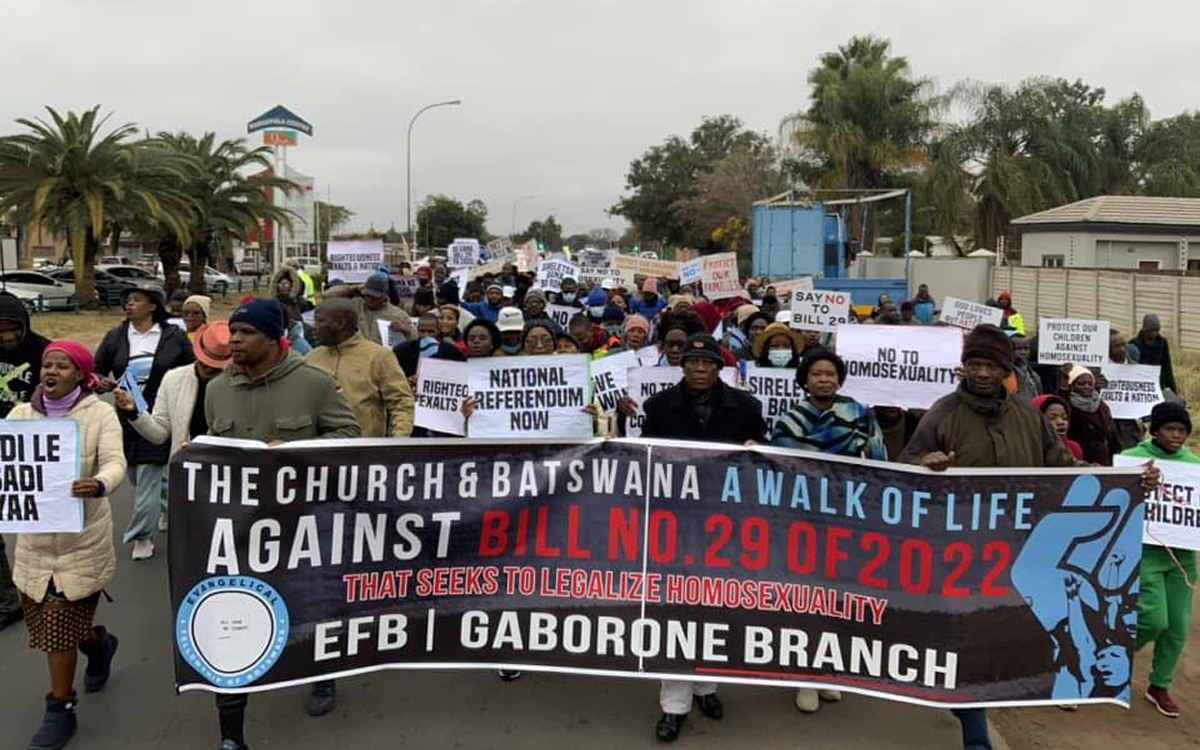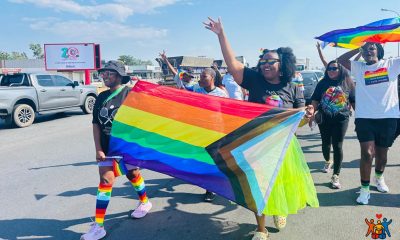Commentary
Botswana religious groups threaten rule of law and refuse LGBTQ rights
Country’s Council of Churches applauded 2019 decriminalization ruling

By Bradley Fortuin and Matlhogonolo Samsam | Botswana is considered a secular state and all people have equal access to religious organizations and institutions. There are three Christian umbrella bodies in Botswana — being the Botswana Council of Churches, the Evangelical Fellowship of Botswana and Organization of African Instituted Churches — all of whom have great influence io public perceptions and attitudes towards various social and rights-based issues.
Faith in action, embracing diversity!
The Botswana Council of Churches, including the Roman Catholic Church, Anglican Church, Lutheran Church and the Methodist Church, in 2019 released a statement applauding the Court of Appeal in decriminalizing consensual same-sex sex in the country. In the statement, the council encouraged its members to abide by the judgment and not discriminate against anyone who identifies as LGBTIQ+. The BCC has been intentional about their views on LGBTIQ+ rights and has continually engaged with queer organizations to get human rights literacy. It is safe to say that they are friends of LGBTIQ+ persons.
Religious discrimination: A barrier to LGBTIQ+ persons‘ rights in Botswana
Recently, there has been a visible increase in anti-LGBTIQ+ rights rhetoric by the EFB and its members, who include politicians. The EFB has been imposing its assumed Christian values on to the nation — a nation that is diverse in beliefs, cultures and identities. Discriminatory behavior towards the LGBTIQ+ community is on the rise, with the EFB being a notable obstacle to progress towards equality. The constitution does provide for freedom of religion and religious practices, but to what extent does religious practices become incitement of violence and hate towards the LGBTIQ+ community?
On Nov. 29, 2021, the Botswana Court of Appeal upheld the decision by the High Court to decriminalize consensual same-sex sexual acts in the country. Beyond this, it affirmed LGBTIQ+ people’s rights to liberty, dignity, privacy, equal protection before the law and body autonomy, as enshrined in the constitution. When the Parliament of Botswana assumed its July/August 2023 session, a bill to amend Sections 164 (a) and (c) of the Penal Code was tabled by the Minister of Defense, Justice and Security, Mr. Ronald Shamukuni. These sections criminalized carnal knowledge against the order of nature and have since been struck down by the High Court and the Court of Appeal in front of a total of eight judges. The procedure to table the bill in Parliament has been said to be standard practice and will in no way go against the orders of the court.
The church threatening Parliament and parliamentarians endanger the rule of law and create an imbalance in the separation of powers by encouraging Parliament to go against the decision of the Court of Appeal. The courts and judges are — and must be — independent of Parliament and the government. The judiciary has already held sections 164 (a) and (c) of the Penal Code to be unconstitutional and ordered it to be repealed. Within the legal framework, Parliament must now adhere to the court’s order and repeal these offences. For the Legislature to attempt or to go against the court’s order shows ignorance of the law, undermining of the Judiciary and disregard for vulnerable and marginalized groups.
The rise of anti-LGBTIQ+ movement in Botswana
Since the motion of intention to table the bill, there has been a stir and public outcry regarding LGBTIQ+ rights and liberties led by the anti-rights movement. The EFB and some politicians have been against the protection of LGBTIQ+ people and increasingly engage in discriminatory behavior against the community. The church, in all its might and power rallied and organized demonstrators to march against the amendment bill by Parliament. There have been three demonstrations in the last four weeks across the country.
Why is the EFB and some politicians opposed to LGBTIQ+ rights? Why are they a barrier to progress towards equality and inclusion of a group that has been vulnerable and marginalized for a long time in Botswana? Why is the EFB vehemently advocating for the recriminalization of LGBTIQ+ rights?
In its messaging, the EFB has been consistent about their message — that LGBTIQ+ rights have no place in Botswana. Amidst this messaging, with the influence that the church has, and the number of followers in the EFB denominations, this card has been used to persuade and manipulate politicians to reject the amendment bill if they want to survive politically.
Botswana goes for its general elections in 2024, and now is the perfect time to start campaigning — or de-campaigning — for politicians. Several politicians are now at the mercy of the EFB and voting for LGBTIQ+ rights is feared to be political suicide. When, however, politicians and the church are willing to rally against the courts, our democracy is at stake.
Avoiding tyranny of the majority
The EFB and some politicians called for the rights of LGBTIQ+ people to be put to a referendum and to have the public decide. By doing so, there is the risk of the majority imposing its will on the people. LGBTIQ+ rights are not a popularity contest and should not be contingent on popular opinion; basic human rights should not be up for debate or subject to the changing whims of the majority as they are not dependent on popular opinion but are inherent to all human beings. LGBTIQ+ individuals have historically faced exclusion, discrimination, prejudice and violence and subjecting their rights to a referendum perpetuates this vulnerability. It undermines the principles of dignity, liberty and equal protection under the law, entrenched in our constitution and upheld by our courts. The views of the EFB are not the views of Batswana at large.
In 2016, the Afrobarometer reported that at least 43 percent of Batswana are not opposed to LGBTIQ+, while in its 2021 report, it reported that 50 percent of Batswana are open-minded and unprejudiced to LGBTIQ+ people. The increased acceptance of LGBTIQ+ persons in Botswana reflects that public opinion is in fact not what the church and politicians are assuming.
To promote fairness and equality, religious organizations must understand that they are separated from governmental structures and should refrain from wielding undue influence on legislative issues that impact members of different faiths, beliefs or those who are not religious. The call to deny LGBTIQ+ people their rights because of fundamentalist religious beliefs perpetuates inequality and discrimination and sends the message that certain groups of people are less deserving of rights and protections in Botswana.
Bradley Fortuin is the LGBTIQ+ Program Officer at the Southern Africa Litigation Center and a social justice activist.
Matlhogonolo Samsam is the Media and Community Liaison Lead at Black Queer DocX and a queer feminist working towards the development of an inclusive LBQ+ society.
Commentary
Honoring 50 queer, trans women with inaugural ‘Carrying Change’ awards
Naming the people who carry our movements forward

Dear friends, partners, and community:
We write to you as two proud Black and Brown queer women who have dedicated our lives to building safer, bolder, and more just communities as leaders, organizers, policy advocates, and storytellers.
We are June Crenshaw and Heidi Ellis.
June has spent almost 10 years guiding the Wanda Alston Foundation with deep compassion and unwavering purpose, ensuring LGBTQ+ youth experiencing homelessness have access to stability, safety, and a path forward. Her leadership has expanded housing and support services, strengthened community partnerships, and helped shift how Washington, D.C. understands and responds to the needs of queer and trans young people. In her current role with Capital Pride Alliance, June advances this work at a broader scale by strengthening community infrastructure, refining organizational policies, and expanding inclusive community representation.
Heidi is the founder of HME Consulting & Advocacy, a D.C.–based firm that builds coalitions and advances policy and strategy at the intersection of LGBTQ+ justice and racial equity. Her work spans public service, nonprofit leadership, and strategic consulting to strengthen community-driven solutions.
We’re writing because we believe in intentional recognition — naming the people who carry our movements forward, who make room for those who come next, and who remind us that change is both generational and generative. Too often, these leaders do this work quietly and consistently, without adequate public acknowledgment or what one might call “fanfare,” often in the face of resistance and imposed solitude — whether within their respective spaces or industries.
Today, we are proud to introduce the Torchbearers: “Carrying Change” Awards, an annual celebration honoring 50 unstoppable Queer and Trans Women, and Non-Binary People whose leadership has shaped, and continues to shape, our communities.
This inaugural list will recognize:
- 25 Legends — long-standing leaders whose decades of care, advocacy, and institution-building created the foundations we now stand upon; and
- 25 Illuminators — rising and emerging leaders whose courage, creativity, and innovation are lighting new paths forward.
Why these names matter: Movement memory keeps us honest. Strategy keeps us effective. Recognition keeps us connected. By celebrating both Legends and Illuminators side by side, we are intentionally bridging histories and futures — honoring elders, uplifting survivors, and spotlighting those whose work and brilliance deserve broader support, protection and visibility.
Who will be included: The Torchbearers will represent leaders across a diverse range of sectors, including community organizing, public service, sports, government, entertainment, business, education, legal industry, health, and the arts — reflecting the breadth and depth of queer leadership today. They include organizers providing direct service late into the night; policy experts shaping budgets and laws; artists and culture workers changing hearts and language; healers and mutual-aid leaders; and those doing the quiet, essential work that sustains us all.
Intersectionality is our core commitment: identity in its fullness matters, and honorees must reflect the depth, diversity, and nuance of queer leadership today.
How you can engage: Nominate, amplify, sponsor, and attend. Use your platforms to uplift these leaders, bring your organization’s resources to sustain their work, and help ensure that recognition translates into real support — funding, capacity, visibility, and protection.
We are excited, humbled, and energized to stand alongside the women and non-binary leaders who have carried us, and those who will carry this work forward. If history teaches us anything, it’s that the boldest change happens when we shine light on one another, and then pass the flame.
YOU CAN MAKE A NOMINATION HERE
June Crenshaw serves as deputy director of the Capital Pride Alliance. Heidi Ellis is founder of HME Consulting & Advocacy.
Commentary
Protecting the trans community is not optional for elected allies and candidates
One of oldest political tactics is blaming vulnerable group for societal woes

Being an ally to the trans community is not a conditional position for me, nor should it be for any candidate. My allyship doesn’t hinge on polling, focus groups, or whether courage feels politically convenient. At a time when trans people, especially trans youth of color, are under coordinated attack, elected officials and candidates must do more than offer quiet support. We must take a public and solid stand.
History shows us how these moments begin. One of the oldest political tactics is to single out the most vulnerable and blame them for society’s anxieties — not because they are responsible, but because they are easier to blame than those with power and protection. In Nazi Germany, Jewish people were primarily targeted, but they were not the only demographic who suffered elimination. LGBTQ people, disabled people, Romani communities, political dissidents, and others were also rounded up, imprisoned, and killed. Among the earliest acts of fascistic repression was the destruction of Berlin’s Institute for Sexual Science, a pioneering center for gender-affirming care and LGBTQ research. These books and medical records were among the first to be confiscated and burned. It is not a coincidence that these same communities are now the first to suffer under this regime, they are our canaries in the coal mine signaling what’s to come.
Congress, emboldened by the rhetoric of the Donald Trump campaign, recently passed HR 3492 to criminalize healthcare workers who provide gender-affirming healthcare with fines and imprisonment. This bill, sponsored by celebrity politicians like Marjorie Taylor Greene, puts politics and headlines over people and health outcomes. Healthcare that a number of cis-gendered people also benefit from byway of hair regeneration and surgery, male and female breast augmentation, hormone replacement therapy etc. Even when these bills targeting this care do not pass, they do real damage. They create fear among patients, legal uncertainty for providers, and instability for clinics that serve the most marginalized people in our communities.
Here in D.C., organizations like Planned Parenthood and Whitman-Walker Health are lifelines for many communities. They provide gender-affirming care alongside primary care, mental health services, HIV treatment, and preventative medicine. When healthcare is politicized or criminalized, people don’t wait for court rulings — they delay care, ration medication, or disappear from the system entirely.
As a pharmacist, I know exactly what that means. These are life-saving medications. Continuity of care matters. Criminalizing and politicizing healthcare does not protect children or families — it puts lives at risk.
Instead of centering these realities, political discourse has been deliberately diverted toward a manufactured panic about trans women in sports. Let me be clear: trans women deserve to be protected and allowed to compete just like anyone else. Athletics have always included people with different bodies, strengths, and abilities. Girls and women will always encounter competitors who are stronger or faster — that is not a gender or sports crisis, it is the nature of competition.
Sports are meant to teach fairness, mutual respect, and the shared spirit of competition — not suspicion or exclusion. We should not police young people’s bodies, and we should reject attempts to single out trans youth as a political distraction. Families and doctors should be the authority on sex and gender identity.
This narrative has been cynically amplified by the right, but too often Democrats have allowed it to take hold rather than forcefully rejecting it. It is imperative to pay attention to what is happening — and to push back against every attempt to dehumanize anyone for political gain.
Trans people have always been part of our communities and our democracy. Protecting the most vulnerable is not radical — it is the foundation of a just society. My work is grounded in that commitment, and I will not waver from it. I’m proud to have hired trans political team Down Ballot to lead my campaign for DC Council At Large. We need more ally leaders of all stages to stand up for the LGBTQ+ community. We must let elected detractors know that when they come for them, then they come for all of us. We cannot allow Fox News and social media trolls to create a narrative that scares us away from protecting marginalized populations. We must stand up and do what’s right.
Anything less is not leadership.
Rep. Oye Owolewa is running for an at-large seat on the D.C. Council.
Commentary
America is going in the wrong direction for intersex children
Lawmakers are criminalizing care for trans youth, while permitting irreversible harm to intersex babies

I live with the consequences of what America is willing to condone in the name of “protecting children.”
When I was young, doctors and adults made irreversible decisions about my body without my informed consent. They weren’t responding to an emergency. They were responding to discomfort with innate physical differences and the social and medical pressure to make a child’s body conform to a rigid female-male binary. That’s the part people like to skip over when they talk about “child welfare”: the harm didn’t begin with my identity. It started with adults deciding my healthy body needed fixing.
That’s why the hypocrisy unfolding right now from statehouses to Capitol Hill feels so familiar, and so dangerous.
While harmful medical practices on intersex children, the nearly 2 percent born with differences in one or more of their physical sex characteristics, have been ongoing in the U.S. for decades, until recently, there was no law specifically condoning it.
This month, House Republicans passed one of the most extreme anti-trans bills in modern American history, advancing legislation that would criminalize gender-affirming medical care for transgender youth and threaten doctors with severe penalties for providing evidence-based treatment. The bill is framed as a measure to “protect children,” but in reality, it weaponizes the criminal legal system against families and providers who are trying to support young people in surviving adolescence.
At the same time, the administration has proposed hospital and insurance policies designed to choke off access to affirming care for trans youth nationwide by making providers fear loss of federal funding, regulatory retaliation, or prosecution. This is a familiar strategy: don’t just ban care outright; instead, make it so risky that hospitals stop providing it altogether. The result is the same everywhere. Young people lose access to care that major medical associations agree can be lifesaving.
All of this is happening under the banner of preventing “irreversible harm.”
But if America were genuinely concerned about irreversible harm to minors, the first thing lawmakers would address is the medically unnecessary, nonconsensual surgeries still performed on intersex infants and young children, procedures that permanently alter healthy tissue, often without urgent medical need, and long before a child can meaningfully participate in the decision. Human rights organizations have documented for years how these interventions are justified not by medical necessity, but by social pressure to make bodies appear more typically “female” or “male.”
Here is the uncomfortable truth: all of the state laws now banning gender-affirming care for transgender youth explicitly include exceptions that allow nonconsensual and harmful intersex surgeries to continue.
A recent JAMA Health Forum analysis found that 28 states have enacted bans on gender-affirming care for minors that carve out intersex exceptions, preserving doctors’ ability to perform irreversible “normalizing” procedures on intersex children even while prohibiting affirming care for trans adolescents.
This contradiction is not accidental. It reveals the real priority behind these laws.
If the goal were truly to protect children from irreversible medical interventions, intersex kids would be protected first. Instead, these policies target one group of children, transgender youth, while continuing to permit permanent interventions on another group whose bodies challenge the same rigid sex and gender binary that lawmakers are trying to enforce.
Intersex people are routinely erased from American policy debates, except when our bodies are invoked to justify harmful laws, warning that intersex children are being used as legal loopholes rather than protected as human beings. This “protect the children” rhetoric is routinely deployed to justify state control over bodies, while preserving medical practices that stripped intersex children like me of autonomy, good health, and choice. Those harms are not theoretical. They are lifelong.
What makes this moment even more jarring is that the federal government had finally begun to recognize intersex people and attempt to address the harms suffered.
In 2024, at the very end of his term, the Biden administration released the first-ever intersex health equity report — a landmark admission that intersex people have been harmed by the U.S. health care system. Issued by the Department of Health and Human Services, the report documents medically unnecessary interventions, lack of informed consent, and systemic erasure and recommends delaying irreversible procedures until individuals can meaningfully participate in decisions about their own bodies.
This should have been a turning point. Instead, America is moving in the opposite direction.
On day one, President Trump issued an executive order defining “sex” in a way attempting to delegitimize the existence of transgender Americans that also erased the existence of many intersex people.
When medicine is used to erase difference, it is called protection, while care that supports self-understanding is treated as a threat. This is not about medicine. It is about control.
You cannot claim to oppose irreversible harm to children while legally permitting surgeries that intersex adults and human rights experts have condemned for decades. You cannot claim to respect bodily autonomy while denying it selectively, based on whose bodies make lawmakers uncomfortable.
Protecting children means protecting all children, transgender, intersex, and cisgender alike. It means delaying irreversible interventions when they are not medically necessary. It means trusting and supporting young people and families over politicians chasing culture-war victories.
America can continue down the path of criminalizing care for some children while sanctioning harm to others, or it can finally listen to the people who have lived the consequences.
Intersex children deserve laws that protect their bodies, not politics that hurt and erase them.
Kimberly Zieselman is a human rights advocate and the author of “XOXY: A Memoir”. The author is a co-author of the JAMA Health Forum article cited, which examined state laws restricting gender-affirming care.


















